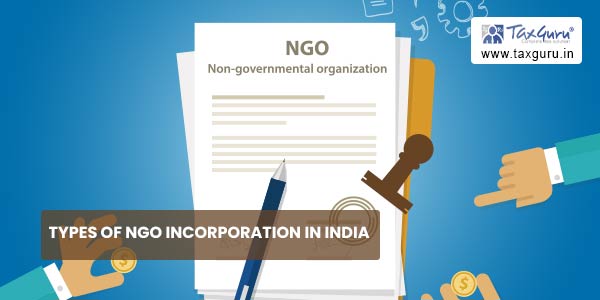They can be Non-Government organizations or Non-Profit Organizations. Both NPO and NGOs function to benefit society and the welfare of humans or improve the world.
A Non-Profit Organization is formed to provide goods and services to the people and also operates on the principle that no member will share the profits or the losses. A Non-Government Organization is formed by ordinary citizens that operate independent of the Government.
A NGO and Nment (Trust Deed)
PO can be registered in the following forms:
Trust (Indian Trust Act, 1882):
- It is an arrange
- between parties (Author/settler and trustee)
- whereby one party (Trustee)
- holds ownership over property (Trust Property)
- on behalf of another person (Beneficiary/ Beneficiaries)
- There are two types of trusts in India:
Private Trusts:
- governed by the Indian Trusts Act, 1882
Public Trusts:
- public trusts are divided into charitable and religious trusts.
- The Charitable and Religious Trust Act, 1920, the Religious Endowments Act, 1863, the Charitable Endowments Act, 1890, the Maharashtra Public Trusts Act, 1950 (governing the public trust in the State of Maharashtra), Societies Registration Act, 1860 are some of the statutes governing the functioning of a public trust in India.
- If a trust is created by a Will it is subject to the provisions of Indian Succession Act, 1925.
To be noted:
- minimum 2 trustees are required.
- no mandatory yearly compliance.
- Less preferred in registration under
- Less preferred Grants and subsidies from the government.
- Stamp duty applicable as per state.
DOCUMENTS REQUIRED FOR REGISTRATION OF TRUST:
- PAN Card and Aadhar card of author and Trustee
- Photo of author and Trustee
- Mobile no. and mail id of author and Trustee
- Rent agreement or ownership papers of property with electricity bill
- NOC from Landlord (If Rented)
- Rent Receipt (If Rented)
Society (Societies Registration Act,1860):
It is formed for a common charitable purpose by people. But it is not limited to charitable purposes but may extend to multiple other fields such as credit co-operative society, housing society.
It is governed by MOA (memorandum of association) and rules and regulations of the society.
It is Registered before Registrar or Deputy Registrar of the particular state in which it is to be registered.
To be noted:
- Less preferred in registration under
- Less preferred Grants and subsidies from the government.
- There are certain annual compliances -need to file the list of names, occupations and address of the managing committee members of the society to the Registrar annually
- Minimum 7 members are required. 5 members must be elected members (Chairman, vice chairman, Treasurer, secretary, executive members).
DOCUMENTS REQUIRED FOR REGISTRATION OF SOCIETY :
- PAN Card and Aadhar card of Members
- Photo of Members
- Mobile no. and mail id of Members
- Rent agreement or ownership papers of property with electricity bill
- NOC from Landlord (If Rented)
- Rent Receipt (If Rented)

Section 8 Company (Companies Act, 2013):
- A section 8 company has in its objects:
- the promotion of commerce, art, science, sports, education, research, social welfare, religion, charity, protection of environment or any such other object;
- Intends to apply its profits, if any, or other income in promoting its objects;
- and Intends to prohibit the payment of any dividend to its members.
- It is governed by MOA and AOA (articles of association).
- It is registered by ROC of respective state.
- It needs to comply with annual and incidental compliance of Companies Act, 2013.
- A section 8 company can be public company or private company without adding the word “LIMITED” and “PRIVATE LIMITED)
- More preferred registration under FCRA.
- More preferred Grants and subsidies from the government.
- Transparency is high.
Documents Required:
- Minimum 7 subscribers(members) in case of public company and Minimum 2 subscribers in case of private company.
- Minimum 3 directors in case of public company and Minimum 2 Directors in case of private company
- PAN Card and Aadhar card of Directors and members.
- Voter ID/Driving Licensee/ Passport of Directors and members.
- Bank Statement of Directors and members. (Carrying entry of transaction not older than 2 month and Carrying address of applicant)
- Mobile no. and mail ID of Directors and members
- Photo of Directors and members.
- DSC of Directors and members.
- Rent Agreement, NOC, Electricity bill and Rent Receipt.
- Mobile no. and mail ID of company
- Proposed Name
- Brief Object





